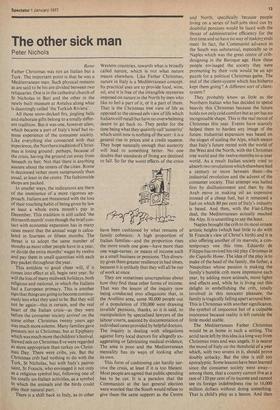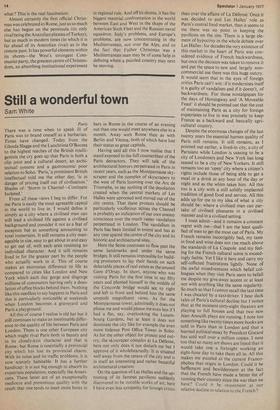The other sick man
Peter Nichols
Rome Father Christmas was not an Italian but a Turk. The important point is that he was a Mediterranean man. Such physical remains as are said to be his are divided between two reliquaries. One is in the cathedral church of St Nicholas in Bari and the other in the newly built museum at Antalya along what is dauntingly called 'the Turkish Riviera'.
All those snow-decked firs, jingling bells and elaborate gifts belong to a totally different tradition. But it was one, however alien, which became a part of Italy's brief but intense experience of the consumer society. Like everything else connected with that experience, the Northern tradition of Christmas is losing ground: perhaps, because of the crisis, having the ground cut away from beneath its feet. Not that there is anything austere about the streets of the cities. Rome is decorated rather more sumptuously than usual, at least in the centre. The fashionable shops are packed.
In smaller ways, the indications are there of the imminence of a more rigorous approach. Italians are threatened with the loss of their touching habit of being given by law at least a whole extra month's pay in December. This tradition is stilt called 'the thirteenth month' even though the brief contact with economic expansion has in many cases meant that the annual wage is calculated in fourteen or fifteen months. The threat is to adopt the same number of months as most other people have in a year, or divide the extra months' wages by twelve and pay them in small quantities with each Pay packet throughout the year.
This antidote to good cheer will, if it comes into effect at all, begin next year. So Will the loss of many midweek holidays, both religious and national, in which the Italians had a European primacy. This is another Sign that things are going to become continuously less what they used to be. But they will not be again—this is certain, and the real heart of the Italian crisis—as they were before the consumer society arrived on the scene either. Christmas twenty years ago was much more solemn. Many families gave Presents not at Christmas, but at Epiphany Which was much more the children's festival. Stewed eels on Christmas Eve were regarded as more appropriate than turkey on Christmas Day. There were cribs, yes. But the Christmas crib had nothing to do with the Turk, St Nicholas, but with Italy's patron saint, St Francis, who envisaged it not only as a religious symbol but, following one of his totally un-Italian activities, as a symbol in which the animals and the birds could play their natural part.
There is a shift back in Italy, as in other
Western countries, towards what is broadly called nature, which is not what nature means elsewhere. Like Father Christmas, nature in Italy is a Mediterranean concept. Its practical uses are to provide food, wine, oil, and it is free of the intangible mysteries imposed on nature in the North by men who like to feel a part of it, or it a part of them. That is the Christmas tree view of life as opposed to the stewed eels view of life which Italians still recall but have no overwhelming desire to go back to. They prefer for the time being what they quaintly call 'austerity' which until now is nothing of the sort: it is a general rise in prices and a credit squeeze. They hope naturally enough that austerity will lead to something better. No one doubts that standards of living are destined to fall. So far the worst effects of the crisis
have been cushioned by what remains of family cohesion : A high proportion of Italian families—and the proportion rises the more south one goes—have more than one wage-earner, or means of income such as a small business or pensions. This diversity gives them greater resilience in bad times, because it is unlikely that they will all be out of work at once.
They are sometimes unscrupulous about how they find these other forms of income. That was the lesson of the inquiry now being conducted into allegations that, in the Avellino area, some 90,000 people out of a population of 350,000 were drawing invalids' pensions, thanks, so it is said, to manipulation "by specialised lawyers of the labour courts, assisted by documentation of individual cases provided by helpful doctors. The inquiry is dealing with allegations against forty local doctors for allegedly exaggerating or fabricating medical evidence. The area is poor and the Mediterranean mentality has its ways of looking after its own.
This form of cushioning can hardly survive the crisis, at least if it is too blatant. Most people are agreed that public spending has to be cut. It is a paradox that the Communists at the last general election were worried that the South would refuse to give them the same support as the Centre and North, specifically because people living on a series of half-jobs eked out by doubtful pensions would be faced with the threat of administrative efficiency for the first time and so have no way of making ends meet. In fact, the Communist advance in the South was substantial, especially so in Naples which was the great centre of cribdesigning in the Baroque age. How these people envisaged the society they were promoting by their vote would be an apt puzzle for a political Christmas game. The end of the client-system which has hitherto kept them going? A different sort of clientsystem?
They probably know as little as the Northern Italian who has decided to spend heavily this Christmas because the future holds not only cold comfort but as yet has no recognisable shape. This is the real mood of Christmas this year. Events have scarcely helped them to harden any image of the future. Industrial expansion was based on the slogan of scaling the Alps, which meant that Italy's future rested with the world of the West and the North, with the Christmas tree world and the twelve-months-to-a-year world. As a result Italian society tried to absorb two revolutions which elsewhere had a century or more between them—the industrial revolution and the advent of the consumer society. That attempt was halted first by disillusionment and then by the Arab move in making oil an expensive instead of a cheap fuel, but it remained a fuel on which 80 per cent of Italy's industry is based. And then, with the Fiat-Libya deal, the Mediterranean actually reached the Alps. It is unsettling to say the least.
Naples brought the crib to its most ornate artistic heights (which had little to do with St Francis's view of Christ's birth) and it is also offering another of its marvels, a contemporary one this time. Eduardo de Filippo has revived his old play Christmas in the Cupiello Home. The idea of the play is to make of the head of the family, the father, a Neapolitan whose passion is making the family's humble crib more impressive each year, by adding more animals, more lights and effects and, while he is living out this delight in embellishing the crib, totally involved in this innocent pleasure, the family is tragically failing apart around him. This is Christmas with another significance, the symbol of innocence but of a culpable innocence because reality is left outside the little model stable.
The Mediterranean Father Christmas would be at home in such a setting. The acrid taste left by this idea is a long way from Christmas trees and wax angels. It is nearer the mood of Italy on the threshold of a year which, with two sevens in it, should prove doubly unlucky. But the idea is still too apocalyptic. Some lessons have been learned since the consumer society went away— among them, that a country cannot live at a rate of 120 per cent of its income and cannot see its foreign indebtedness rise to 16,000 million dollars without doing something. That is child's play as a lesson. And then what ? This is the real fascination.
Almost certainly the first official Christmas was celebrated in Rome, just as so much else has begun on the peninsula (its only rival being the Anatolian plateau of Turkey), but as much in modern times (in which it is far ahead of its Anatolian rival) as in the remote past. It has powerful elements within its shores—the West's strongest Communist party, the greatest centre of Christendom, an absorbing institutional experiment in regional rule. And off its shores, it has the biggest material confrontation in the world between East and West in the shape of the American Sixth Fleet and the Russian naval squadron. Italy's problems, and Europe's problems, are now concentrating in the Mediterranean, not over the Alps, and so the fact that Father Christmas was a Mediterranean man may be of some help in defining where a puzzled country may next be moving.























































 Previous page
Previous page